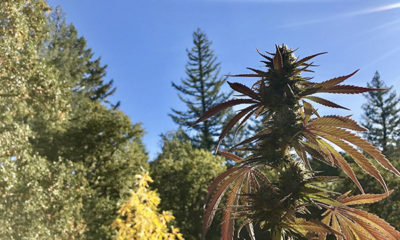
Joint Opinions
Cannabis Can Help Fight Alcoholism
Alcohol can destroy lives but, cannabis is helping people to pick up the pieces and rebuild.
I grew up in an era when Nancy Reagan’s “Just Say No” campaign proliferated through the airwaves, proclaiming marijuana would sap my motivation, destroy my relationships and prevent me from leading a life of purpose.
But after nearly two decades of excessive drinking, lost jobs and homelessness — along with multiple attempts to permanently get off the sauce — I realize that Reagan couldn’t have been more wrong: Cannabis saved me.
Marijuana use has proven immensely positive for me, and it has allowed me to refrain from staring at the bottom of a bottle ever again. However, a majority of folks in the recovery community refer to cannabis as “dangerous,” a “trigger for relapse” and a “stumbling block.”
Anne Lewis, an addiction counselor and clinical psychologist at Indiana University Health, told US News that cannabis “lowers your inhibition, so you don’t care,” which she said could lead to relapse. “We don’t make good decisions when we’re drunk or high,” she said.
Foundations Recovery Network, a Tennessee-based clinic which treats what they call a “dual diagnosis of substance addiction and mental health disorders,” also believes that cannabis use is detrimental to alcohol recovery. Citing the Journal of Experimental Analysis of Behavior, they say people using cannabis as a treatment technique “are somewhat sedated and calm… [and] less inclined to handle tasks associated with addiction recovery,” like going to meetings and attending therapy sessions.
And though it’s also commonplace for physicians and psychiatrists to prescribe benzodiazepine (among other drugs listed as Schedule IV narcotics) to curb alcohol addition, I wondered why my more natural approach was frowned upon, at best — especially if it was working so well for me.
Joe Schrank, founder of High Sobriety, a controversial recovery clinic in Southern California that uses cannabis as a component of its therapy program, told me in an email that “benzodiazepines may be [helpful tapering] someone off of alcohol.” But, he added, “I don’t think the question is so much why they are used for detox or replacement, as much as why cannabis isn’t offered as an option.”
Schrank also disagrees with the notion that pot could entice me into reverting back to my old ways. “The idea that cannabis use leads people back to alcohol is flawed,” he said.
“Most people who go to rehab never achieve total abstinence but they try,” said Schrank. “Maybe total abstinence leads them back to alcohol use.”
My history with the drink is extensive and extremely destructive. It also happens to be the longest relationship I’ve ever maintained. Finding a way to live life productively without it — and to do the least amount of harm to myself — has become paramount. It’s why I ended up giving pot a try in the first place. Schrank told me, “88,000 people a year drink themselves to death, while there is no lethal dose of cannabis.”
I struggled with anxiety and depression for most of my life, and like many, used alcohol to cope. Until now, it’s been the only substance that calmed my anxious body and mind. It’s a hell of a drug. It’s legal virtually everywhere, it’s socially acceptable no matter your socioeconomic status and almost everyone is a user.
But by the time I began my first job out of college, I was consuming a 12-pack of beer each day after work. My commitment to quell my anxiety — and most likely a hereditary disposition to addiction — eventually led to an 18-pack or more per-day habit.
I soon found it difficult to maintain my career, one that I’d dreamed of and even excelled at. I also found it difficult to keep a roof over my head, too, and ended up on the streets of San Francisco for a spell — sleeping in doorways and on park benches at the Ferry Building.
But I wanted to quit, so I gave 12-step programs a try. At first, things would appear to go well and I’d lay off the hooch for a bit. But ultimately, I’d be ostracized by other members for not working the program in a way they saw fit, even though I had stopped drinking. I also had a problem with programs that emphasized believing in a “higher power,” and for most group members, my lack of belief was an issue.
When I realized meetings weren’t a good fit for me, I went to a mental health clinic to see a therapist. I’m not sure what I expected, but the doctor suggested I try Valium — a drug that sounded much more addictive than alcohol, so I declined.
Eventually after a few attempts, I was able to quit cold-turkey and stay sober. But even after I was “clean,” I still felt horrible all the time. Depression consumed me. Anxiety attacks increased. I was frustrated that I was either destined to be on prescription drugs for the rest of my life — with all of the side effects that accompany it — or feel terrible all of the time.
Thankfully, a former roommate had just returned from trimming one fall, and had bags of shake and flower originally destined for the compost bin.
I asked him for a bit — not because I thought it would help me with my crippling anxiety — but because I wanted an escape.
But to my amazement, after smoking, I felt utter relief.
I didn’t feel inebriated, out of control or unable to function. I felt… normal, for the first time in my adult life. And most importantly, I lacked any craving for a drink.
Convinced I was on the right path, I obtained a medical cannabis recommendation from a physician and I experimented with different strains and methods of consuming the medicine until I found something that worked. For me that means a sativa-dominant hybrid like Blue Dream during the day, an indica-dominant hybrid like Emerald Cup OG or Gorilla Glue for help with sleep at night and low-dosage Petra mints throughout the day as needed.
Some research surrounding the potential benefits of pot use to combat alcoholism has uncovered positive results, most notably a 2009 study published in the Harm Reduction Journal that found 40 percent of study participants successfully replaced alcohol with cannabis.
But while weed maintains itself on the federal government’s list of the most harmful drugs one can imbibe — along with methamphetamine, heroin, and MDMA — widespread acceptance as a treatment for addiction is a long way off.
And despite all of the warnings from recovery professionals, the federal government — and Nancy Reagan for that matter — who all believed I’d be triggered to relapse or become too complacent to maintain abstinence from alcohol, I was able to quit.
Relationships with family and friends have been rekindled. I’ve become more engaged and have tried new things which previously would have sent me into an anxious fit. I also still have no desire or craving to drink. Ever.
Though many folks suffering from addiction, anxiety or depression might find it palatable to undergo more conventional methods of maintenance with drugs like Xanax, Klonopin, Ativan, Zoloft or Paxil, I prefer to stick with the herb.
My life is so much better with cannabis.
TELL US, does cannabis help you cope with addiction?
























